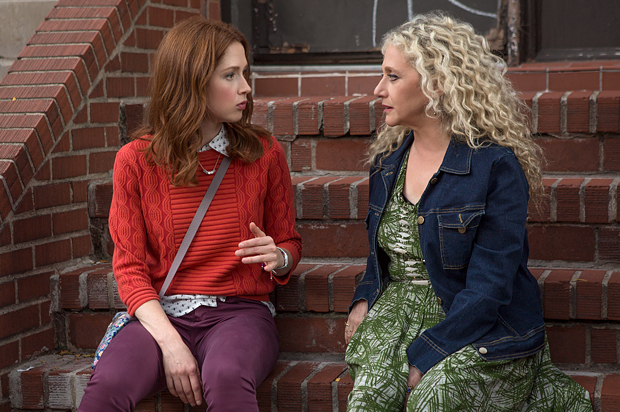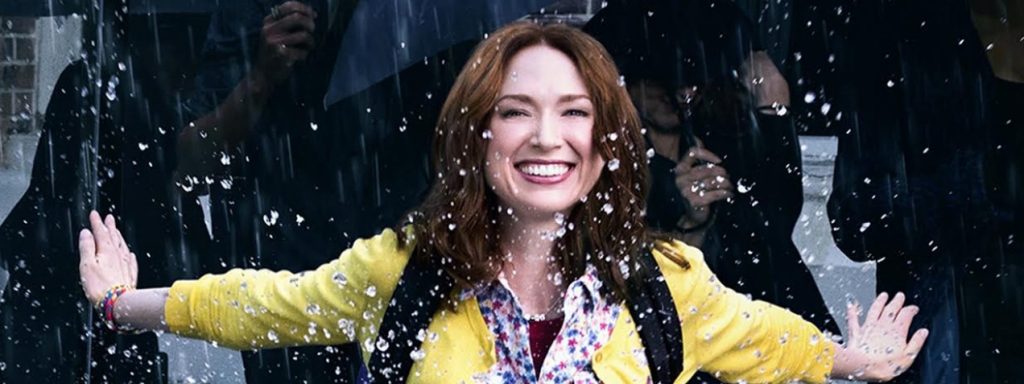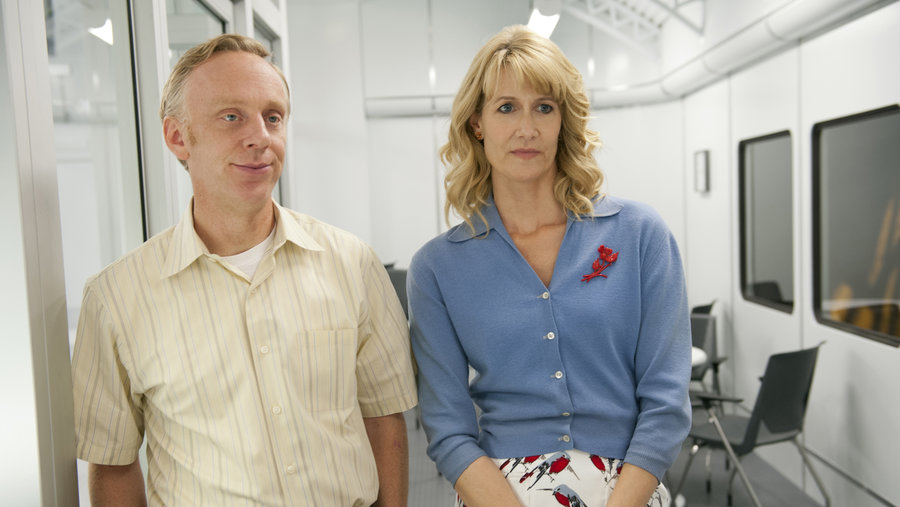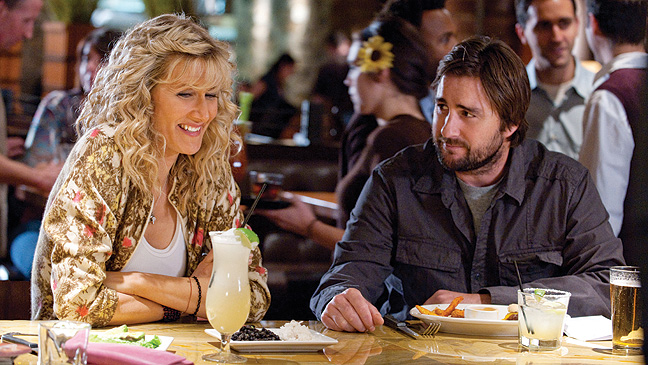Alex writes about Unbreakable Kimmy Schmidt and (for some reason) the long-defunct program Enlightened.
I want to preface this with something. This is an essay about the television shows Unbreakable Kimmy Schmidt and Enlightened, an essay that looks for similarities in two vastly different styles of comedy programs that were never on the air at the same time. Since Laura Dern is the unequivocal star of Enlightened – and if you know only one fact about Enlightened, that is probably the one – at some point during reading this you will think, “Alex is obviously writing this essay because Laura Dern made a guest appearance in episode 3.03 of his relationship with Unbreakable Kimmy Schmidt.”
Laura Dern does appear in Unbreakable Kimmy Schmidt, that I cannot deny (nor would I want to; her appearance was a wonderful surprise). But I can promise you I was thinking about Enlightened earlier in May, before the new season of Unbreakable Kimmy Schmidt started streaming. I had been thinking about Enlightened for reasons that were entirely unrelated to Ellie Kemper’s temporary televisual acquaintances, the rise of Netflix, or even the concept of television at all. Which surely proves the quality of Enlightened more than the words that follow this preamble ever could.
And yet I feel compelled to try. Read on, fair bored person, but read on knowing that I have no editor to please. Nobody encouraged me to write this to capitalize on the upswing in Unbreakable Kimmy Schmidt internet content mixed with a half-throwback critical reprisal of an HBO show that went off the air almost five years ago, because there is no capital for me to gain here. I am doing this on my own time, entirely for my own pleasure. Cultural criticism is a bizarre hobby, but this is the hobby I have.
In what has preceded and what is to follow, though, I am aware you will believe what you will.
Since premiering on Netflix in 2015, Unbreakable Kimmy Schmidt has been one of my favourite television programs. A Sunday in March was hijacked after a friend told me to give one of the episodes a try, and that one quickly turned into thirteen. I do not recall why a 30 Rock-loving dummy such as myself did not immediately run to this show, but that matters not. What matters is that the show was fantastic, and only got more so when season two came a year later.
In discussing the show with others, I often find that people do not have the same level of adoration for it that I do. This is not uncommon with things in my life, be it the cinematic adventures of Tom Cruise, the overlong post-rock stylings of Godspeed You Black Emperor, or consuming Oreo Thins, but it did seem surprising that many of my fellow 30 Rock fans were not supporting this show quite like they had Tina Fey’s NBC output.
To say that 30 Rock was a great television show somehow feels like I’m underrating it. I love 30 Rock with every fibre of my being, and I would imagine that I accidentally quote it more days than I do not (and have been doing so since 2006). But somehow, I never felt an attachment to the show the way I did with most of my favourite shows; typically I prefer some sort of thematic attachment to the characters, and outside of being kind of grumpy and sharing an appreciation of eating whole boxes of cookies in one sitting, Liz Lemon and I did not have that much in common. She was the lone human in a show of caricatures, and I did not see much of myself in her. I don’t mean that as a detraction of 30 Rock; if anything it shows how truly impressive that well-oiled joke machine was. 30 Rock was a show I loved from six days after it premiered (which is when myself and then-roommate James watched the pilot), and that love only grew stronger as time passed and the show somehow got even better. All that said, I never found myself thinking about it when I wasn’t watching it. The same cannot be said for Unbreakable Kimmy Schmidt.
Now, given my reasoning for not being attached to 30 Rock due to not finding enough similarities between myself and the show’s lone non-caricature, saying I see a reflection of myself in Unbreakable Kimmy Schmidt – a show with a core made up entirely of caricatures – seems bizarre. I understand this, and there is no clear parallel here either; I am not Lillian and she is not I. Somehow, though, it seems that by removing the one grounding character from the zany stylings of Fey and Robert Carlock makes Unbreakable Kimmy Schmidt easier to view through an abstract lens. With Liz Lemon, it felt like 30 Rock was meant to be viewed as this one normal woman surrounded by a world of insanity; in Unbreakable Kimmy Schmidt, the world and the people in it are pretty much top to bottom nutso. Which only feels more appropriate with each passing day.
When watching Enlightened’s first season soon after it finished airing in 2011, I was struck by a number of elements: Laura Dern was fantastic (as was Mike White and pretty much every other supporting actor), the cinematography was patiently gorgeous, and the score was the best score I had ever heard in a television show. Tonally the show felt like it picked up where Six Feet Under left off, where (I’m told) Transparent would continue once Enlightened was canceled. It was the real world, slightly askew.
These were all side aspects to the thing I loved the most though, the element that carried through every aspect of Enlightened: this was a show about a woman who had been emotionally broken by the world she was in, and sought to change it. But in attempting to change her world, she found that others had different problems that needed to be accepted as well.
Now, Amy doesn’t do this all the time; most of the time she learns reluctantly after forcing her ideas on others for the first twenty or so minutes of the episode. The best example of this is probably the river retreat episode, which features much meddling on the part of Amy, meddling that ends with her recounting how everybody on the trip with her had a different journey to experience without her interference. That guy who wrote for the Rockford Files maybe didn’t want to spend his time in Hollywood anymore; Levi has his own path to sobriety (or perhaps he doesn’t at all). The old couple is what Levi and Amy could have been, the couple that the young lovebirds could grow into if they manage to avoid the myriad sadnesses that affected Amy and Levi.
But most of the time throughout Enlightened, Amy so fully believes she is the wokest one in the room, despite the fact that this show was canceled before the term “woke” was adopted by the masses. She is trying to find enlightenment, but believes so firmly in what she wants to that she can’t accept others having a differing path to happiness. Amy’s path to so-called enlightenment often involves her being more selfish than one can take; the scene at Krista’s baby shower where Amy derails the festivities with a speech about her starting an Abaddonn Women’s Group is still impossible for me to watch even though I have technically hit play on that episode (at least) three times. Amy is the one who knows everything, she thinks, and yet she cannot read the room.
When we first meet Amy, she is in the midst of a complete breakdown: it seems a combination of infidelity, alcoholism and a corporate lifestyle have emotionally demolished her. So she goes off to her retreat, where she encounters a sea turtle that may or may not be God, and comes back to Abaddonn Industries a new woman willing to live laugh love and be the change she sees in the world and whatever other hacky quotes adorn office-bound coffee mugs.
The best part about Enlightened – and the part that seems mildly prescient watching it six years after its initial premiere* – is how well the depiction of Amy captures the way we picture the average social justice warrior today. Near the beginning of an episode late in season one, Amy drives past a protest that seems to be being held by a group of janitors, honking her car horn to imply that she is down with the cause. Today, this scene is spectacular, as it plays Amy’s contributions to the protest as little more than noise pollution, a person simply screaming something instead of nothing; it’s pretty easy to imagine Amy doing the same thing via Twitter today over whatever Trump’s latest world-endangering folly**. By the end of this episode – because, per the show’s core idea that we all can grow and we all can learn – Amy gets out of her car and physically joins the protest. Whether or not they are able to accomplish something is neither here nor there, but at least for the time being Amy is present with those she wants to help.
*The other notable thing is that, when I was watching this in 2011, the twenty-six minute episodes felt kind of long for a comedy, whereas now it almost feels short. We have become totally used to comedies like Unbreakable Kimmy Schmidt, Master of None, season four of Arrested Development, and even the final season of Community crossing the thirty-minute mark that anything slightly less than that now feels breezy.
**It should be noted that Enlightened tackled Twitter head on in season two, and the results were unsurprisingly thoughtful and funny.
Something that is always discussed in passing when Unbreakable Kimmy Schmidt is brought up is the idea that the show is about trauma. Which it obviously is, but to such an extent that almost nobody feels comfortable spelling out exactly why. That said, Emily Nussbaum said it best in a March 2015 review for the New Yorker: “[Kimmy, after being kidnapped] then endured—the show strongly implies—pretty much what you’d imagine. When Kimmy escapes, however, she doesn’t look wrecked: instead, her expression is pure sunshine, a toothy grin of astonishment and delight. In her intractable optimism, she shares something with another Indiana native, Leslie Knope, from ‘Parks and Recreation,’ except that this is a Leslie Knope who has been to Hell.” Later in the piece, after describing the bright appearance of the show, Nussbaum describes Hell more explicitly: “Yet, without any contradiction, it’s also a sitcom about a rape survivor.”*
*Even if the show were to run for twelve seasons, I find it difficult to imagine anybody writing a better piece about Unbreakable Kimmy Schmidt than what Nussbaum wrote during its first. It should also be noted that Unbreakable Kimmy Schmidt actually used the word ‘rape’ this season for the first time.
This survivalist theme permeates pretty much every core character on the show in differing capacities: Titus escaped a small-town in Mississippi that did not approve of his sexual orientation, Lillian is a widow*, and even Jacqueline is adjusting to a normal-ish life after being trapped by her own long-held capitalistic beliefs. At one point in season three, Lillian’s new lover Artie casually mentions his PTSD from fighting in the Vietnam War. None of these things are played for drama, in fact they’re all played for exactly the opposite, but this bubbly and rapid-fire joke machine of a show still remains deeply dark. Here is a selected list of moments from the third season I could remember and scribble down:
- Titus gets creepily propositioned by the producer of a Sesame Street-style children’s show
- Kimmy rows crew at Columbia because of her skills turning the crank in the bunker
- Russ’ brother and father casually joke about their life-affecting alcoholism
- Titus gets scurvy
- Robert Durst gives relationship advice
- Wendy (Laura Dern’s character) casually mentions having cereal flipped at her by a former lover, before making jokes about being tazed
- Russ becomes a shitty, shallow person once he recovers from being fully smooshed, which simultaneously dampens his desires to help the less fortunate and destroys his relationship with Jacqueline
*Admittedly, she shot her husband Roland in the face herself, but that’s still something one has to work through. She does seem to want to keep her neighbourhood like it was in the 1970s, a time not so coincidentally before Roland died.
This is a haphazardly put together list; I’m certain I am forgetting plenty, let alone the earlier seasons. But I am not forgetting the bunker, the only one that truly matters, because Kimmy is the one who turns the metaphorical crank of optimism – nope, shut it down. Kimmy is the person everybody in her life looks to because – despite being through the worst life has to offer – Kimmy somehow still believes life can be the best.
As Enlightened progressed through its eighteen episodes, other elements were tackled – there is a strong theme of corporate malfeasance and ignorance I adore that runs through Enlightened – but the most striking episodes were always built around following a day in another character’s life. My favourite single episode is Consider Helen, an episode that shows us a day in Amy’s mother’s life; this might not seem so revolutionary in 2017, but in 2011 I can assure you that you were surprised by this choice. (A similar episode about Levi exists in the second season, and there’s an even better one about Tyler as well.) As Amy progresses on her journey out of her own darkness, she slowly has to accept that others around her matter, and that’s what these journeys outside of a traditional narrative give us; literally a day in somebody else’s life. Replacing Amy’s journal-style voiceovers with a hall of memories-style presentation of another voice entirely is jarring and wonderful, and gives a voice to the voiceless in a way Amy consistently says she wants to do but has trouble accomplishing in practice.
Despite its absurdist stylings – especially in the basement level* that houses Amy’s department Cogentiva – Enlightened comes off as a more realistic show than Unbreakable Kimmy Schmidt, simply because nobody in Fey and Carlock’s world ever really seems like a real person. There are real emotions discussed, but the people discussing them are still caricatures; Enlightened occasionally introduces you to somebody you could conceivably meet in whatever corporate environment you have been shoehorned into, and as such some of its ideas are more pointed and easier to apply to your own life.
*I will not say bunker, I will not say bunker, I will not say bunker…
Enlightened’s run was cut short; that it received a second season at all seemed to be exclusively because Dern won a Golden Globe for her performance in season one. As such, we didn’t get to see where Dern and co-creator Mike White (who, with the exception of one ‘story by’ co-credit for Dern, is the sole credited writer throughout the eighteen episodes) wanted to take Amy. There are details out there, most of which focus on Amy’s battle with Abaddonn Industries, but I find it hard to believe the show would have moved away from Amy’s continued struggle to fit in with her world. A show gets canceled without proper resolution because nobody watches it; a life continues without resolution because that is the only way human existence works.
At its core, though, what we see is Amy getting past a traumatic period in her life and trying to reposition herself in the world in a way that can also make it better for others. Whether or not what she’s doing is ultimately selfish is up for (and worthy of) a debate, but she absolutely means well. Whether or not her aim is true, at least now she’s getting the arrow from the proper quiver.

In the final act of season three’s finale, Kimmy is feeling especially demolished by the world, having just been rejected for a crossing guard position due to her marriage to Reverend Wayne (which she did to save Donna Maria from the fate). She stumbles into her sideways tugboat of an apartment and begins telling Lillian a story about Vidalia onions.
“A Vidalia onion is not an apple. When I was a kid, there was a story on the news about a new kind of onion that was so sweet you could eat it like an apple: Vidalia onions. My mom and I thought that was so cool, like Willy Wonka’s Gobstoppers. So, we got on her ATV, went to Kroeger’s, and bought a bag of Vidalia onions. We didn’t even wait to get home. We sat in the parking lot and on three, we each took a huge bite. And you know what they tasted like? Fudging onions.
The world is a Vidalia onion. It’s a lie, it stinks, and it makes you cry. Sooner or later you just gotta stop biting onions.”
Sans one mention of an ATV, this story isn’t played for laughs at all; it’s the most dramatic moment in the season, and it might even be the only one. It comes out of nowhere but – due to Ellie Kemper’s performance and some solid writing – still manages to play pretty much perfectly. Somehow, despite years in a bunker, it is her time in New York that has finally broken her down. Missed connections with a soon-to-be-deported Dong, trolling the respawn with Jeremy, flunking out of Columbia, and not becoming a crossing guard have finally broken her down. The world has become a tub she can no longer thump her way out of.
Through a chance meeting with Kimmy’s fellow student Zach, Lillian uses Zach’s need for help as a way to bring Kimmy out of her depression. He needed Kimmy’s help, which Lillian feels would give Red some purpose, a suspicion that proves correct as Kimmy puts down her drinking alcohol to go work at Zach’s new business and hang out with (allegedly) adorable dogs all day. Kimmy has bit into a million onions at this point, and this job might turn out to be one as well, but at least for the time being she has found an apple that will allow for her to crack an absurd number of dog puns all day.
In the final episode of Enlightened, there’s a similar scene where Amy and Levi are sitting on Levi’s stoop. Amy has taken drastic steps in her quest to take down Abaddonn and is feeling conflicted about it, but since Levi seems to be getting slightly closer to his own enlightening (partly due to Amy’s guidance), he’s willing to say something kind.
Amy: “Am I crazy?”
Levi: “No. You’re just full of hope. You’ve got more hope than most people do. It’s a beautiful thing to have a little hope for the world, you know?”
The Unbreakable Kimmy Schmidt is a truly dark show about optimism, and Enlightened was a truly optimistic show about darkness. To each show, the world is a place out to destroy you, an apple continually waiting to remind you that it is, in fact, an onion. There are fewer dog puns in Amy’s world, but the resilience maintains, and that Abaddonn boardroom wall covered in images of onions will be conquered (or at least adapted to). These are shows about reacting to such realizations, and they are shows about people who (with some mild exceptions) refuse to quit their quest to better their own existence, and better the existence of others. Kimmy and her ragtag gang of co-stars continually have to deal with difficult situations, and Kimmy has to navigate her life after having more than a full decade of it ripped away from her by a force of evil nature. Amy was never in a bunker like Kimmy, but pretty much everything else about that description applies to her as well; everybody has their own defining sadnesses to (attempt to) conquer. Whether or not that is possible is another question entirely, but the attempt is encouraged.
Don’t try to stop her, because she never will.







